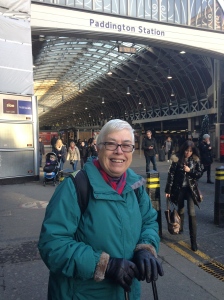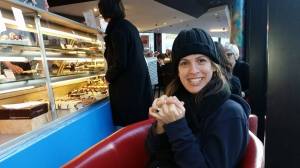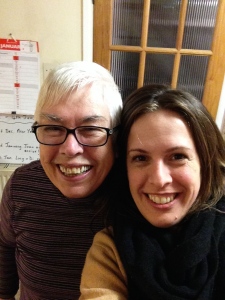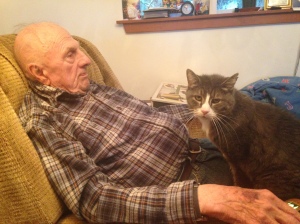“I’m having Christmas with my family like I do every year,” says Dad, playing the dementia card for dramatic effect as he knows full well the family is all away this year.
“With my daughter,” he adds, another set up followed by a long pause for his pending punchline.
“Jessica,” he says, referring to one of Barbara’s girls who has invited him to Christmas dinner.
The joke reassures me he’s not upset about my absence over the holidays.
“Say hello to Elizabeth for me,” he says when I call to check in, “and keep the Senior Warden out of trouble.”
Tywardreath, Cornwall
“Are you talking on the phone?” Henry asks pointing at my laptop.
“I’m writing stories,” I say.
“She’s probably writing stories about us,” says Mum.
“You can call it, ‘Ready to Die,’” says Henry.
I met Henry and Eva on my first trip to England with Mum in 1988. Mum’s first cousin had worked for Cadbury’s for 10 years, but was running his own fudge factory out of his garage by the time I met him. A gentle giant and his tiny dynamo wife, I loved them instantly.
“They’re very old then,” says Henry about friends of Mum.
“About old like us,” replies Mum.
“You mean nearly dead?” asks Henry.
After Sam died at 17, absenteeism had me out of high school and working as a waitress at a late night pizzeria for the after-bar clientele in Victoria. I remember counting tips on my boyfriend’s mattress on the floor of our first apartment together, saving up for my third trip to Europe.
In 1994, I flew to England by myself for three months taking buses and trains to stay with various family members and friends in England and France. Henry and Eva were a particular highlight.
I remember Henry at the railway station smoking a cigarette by his car, a habit we pretended to keep secret from Eva, but which ignited a camaraderie of slipping away to smoke fags together in the fudge factory, essentially erasing the 44 year age gap between us.
During my stay, I read every Eva Taylor romance novel I could get my hands on. Eva, a former English and History teacher, has published 43 novels; the best part, according to Eva, were the hoots of laughter she shared with her friend Ellen brainstorming ideas for romantic folly.
The last time I saw Eva and Henry was at their golden wedding anniversary in 2005. Pub crawls, bowling, boats and hot air balloons, the event climax was a dinner in a big white tent in their’s son’s back garden in Bath, complete with touching speeches and the bride in her original wedding dress fifty years later.
“Getting old is no fun,” says Henry.
“Don’t do it!” he adds pointing at me.
Now in their mid-eighties, Henry and Eva are coming to the end of their fairy tale lives together. A diamond anniversary approaching this summer, memory and other health problems no longer make living on their own a responsible option.
“I need a shave,” says Henry walking towards the stairs.
“I’m traveling by machine,” he says as the stair lift carries him up to the second floor.
On our way to celebrate our latest reunion with a night out at the indian restaurant, Eva walks around the house with one shoe in hand unable to find its match. Next is the inexplicable disappearance of her hat and gloves. Once sorted and in the car, it takes Henry a good five minutes for the key to find the ignition. Driving in the dark, down the narrow curvy cornish lanes, Henry says he’s going to pack in the driving when the insurance runs out. Mum and I both agree it’s probably for the best.
“You can’t open a book without seeing the word dementia these days,” says Eva regularly.
At the restaurant, Eva decides on the chicken masala before remembering that she doesn’t want chicken due to a program she watched on the tele. She reads the menu again and chooses the chicken masala again before remembering she doesn’t want chicken due to a program she watched on the tele. And so it goes several more times before the server arrives to take our order. Eva tries the spicy pickles with the pompadoms and though they are too spicy for her the first time, she puts a large spoonful in her mouth, almost defiant, when we warn her that she’s already tried it and didn’t like it. I move the bowl out of her sightline as she coughs on the heat.
As the days go on, Eva is plagued by an anxious restlessness. She doesn’t remember where the dishes belong, finds random things like a piece of cake or a boiled egg in random cupboards and drawers. Nervous of sell by dates, she throws the frozen turkey in the bin several times before it’s finally fished out to cook for supper.
Only three activities calm her during our visit: walking, knitting dishcloths and drinking wine. Our bond is forever secured when I pull out my own needles and we knit dishcloths over wine across from each other.
“I don’t think we lose whatever we decide,” says Henry, “but Eva is not keen on Tregany.”
Henry too is struggling. He is quick to forget, but not as quickly as Eva. With an old man shuffle, he checks on her if she’s gone off on her own too long. After decades of this little woman caring for him and leading the way, Henry doesn’t have the skills or the strength to take over for Eva now. He’s anxious for outside support such as the nearby assisted living home in Tregany, but is too loyal to Eva to go against her wishes.
“She was a terrible teenager but she’s turned into a lovely woman,” says Henry, “She takes care of us.”
Their daughter Julie has moved south temporarily to help them transition into the final stages of life. I am reminded of the sadness, fear and conflict that comes when roles reverse and elderly parents are faced with the ultimate surrenders of independence and life. Some, like Henry, let go easily, while others, like Eva, fight against the dying of the light.
“Sometimes I feel cross,” says Eva when we talk of old age and death.
My last night in Cornwall, I hear the escalating emotion in Eva’s muffled voice from the other room. She doesn’t want her beautiful life to change. But it already has.
Solihull, West Midlands
“It’s Rob’s birthday today,” says Mum’s cousin, Flo, when she picks us up at the Birmingham railway station.
Rob is 93 years old. He still drives and goes golfing three times a week. So does his wife, Flo, who is 83.
Their home is a time capsule. Though they’ve both faced serious health concerns and look a few years older than I remember, nothing of any great significance has changed. They are still actively engaged and sharp as knives.
“Rob’s off to see the other woman,” says Mum as Rob gets up from his chair and heads for the stairs.
The other woman is a long running joke I remember from when I was 12: his computer.
“Katie says you’re reading a thick book on Python programming,” says their daughter, Carol, over balti in Birmingham.
“Yes, it’s a thick one,” says Rob, “But not as thick as I feel reading it.”
Rob gets the program running during our visit. He is absolutely not thick.
“Did you mention your age?” asks Mum when Rob hangs up his call to the heating repair company.
It didn’t cross his mind to exploit his age for special treatment.
“I can get out the zimmer and slouch over when they get here if you think it’d help,” laughs Flo.
(A zimmer is a walker in British.)
“It’s important not to rush into these types of decisions,” laughs Kristin over Skype, “You and Rob were looking into retirement housing when I was there over twenty years ago!”
As the days go by, Flo cooks and Rob deals with the dishwasher. They each have their daily tasks and Mum and I are not allowed to take them over. They have a housecleaner that comes once every couple of weeks but the day to day work of living helps keep them going.
“Rob will move the second Carol tells him to,” says Flo, reassuring us that they’ve made the necessary arrangements for when the time capsule breaks.
Bless their cotton socks.
Menston, Yorkshire
“I haven’t seen you since you were this big,” says Grace, Henry’s older sister, 86, holding her hand at the height of a small child.
Grace never knew me as a child. She doesn’t remember who I am. She’s graciously trying to protect my expectant eyes from her dementia.
Grace now lives in a very nice assisted living facility near her daughter’s home.
“You look just the same!” says Grace touching my shoulder an hour later over fish and chips and friendly conversation.
She still doesn’t remember me, but at least I now feel familiar.
A game of memory, Grace points at the photos on her bedroom wall and lists the names of her children, scoring three out of four.
“I don’t remember who that is,” says Grace pointing at a black and white photo of a young man, “but I think it must be my husband.”
“I haven’t seen them in years,” says Grace of family, which isn’t true but must feel that way when the past erases itself so quickly from the mind’s view.
“It must be hard to let go after so many years of marriage,” says Grace’s daughter, Briony, of Eva and Henry.
“I don’t know,” says Mum, “I found 12 years to be more than enough.”
We laugh and talk about Dad.
“Oh yes,” says Grace happily surprised at home that night, “I’m Briony’s mother!”
“Thank God we had daughters,” said Eva to Mum when we were in Cornwall.
In my family and perhaps the world, there is an obvious trend.
“Je n’ai jamais l’occasion de parler français,” replies Grace with elegant ease when I speak to her in French.
“Comment s’appelait ton copain en Suisse?” I ask remembering her late night stories over wine about love, war and life when my younger self used to visit.
Her face goes blank. Her fluency stalled. I scold myself for getting tricky by speaking French.
“I can’t remember his name,” says Grace, “Isn’t that terrible?”
I scold myself again, this time not for speaking French, but for asking a question that requires an answer dependent on memory. Language is not the problem.
“But you’re still you, Grace,” I say when she complains about her memory.
“Oh yes, I still know who I am,” she replies and then pauses.
“Just!”
“Now,” says Grace getting up to go to bed, “where am I?”
I smile.
“No really,” she says calmly, “I don’t know where I am.”
Saanichton, BC
“He was a long suffering father,” says Dad pretending to read the obituaries.
I took the ferry to the island from the airport without stopping to see my husband in Vancouver first.
“This one’s too long,” Dad says pointing at an obituary the length of the newspaper.
“I’ll just read the name,” he says honouring the fallen.
I drink tea and pay overdue bills beside him.
“Survived by his wife of 60 years,” he reads and then adds, “Even a murderer gets out in 20.”
My eyes are heavy. Jet lag sets in.
“Four and a half hours until bedtime,” says Dad looking at his watch.





Bless you sweet Katie for your listening ear. All these lovely moments with family at the end of their lives, a beautiful read. Thank you for sharing with us. xoox
Thanks Moni. xx
Great slice-of-life writing, Katie.
Thanks Don!